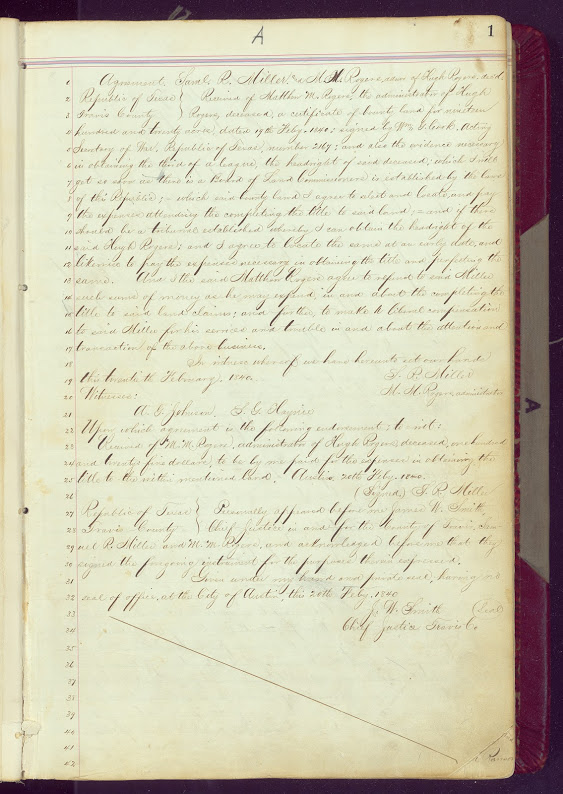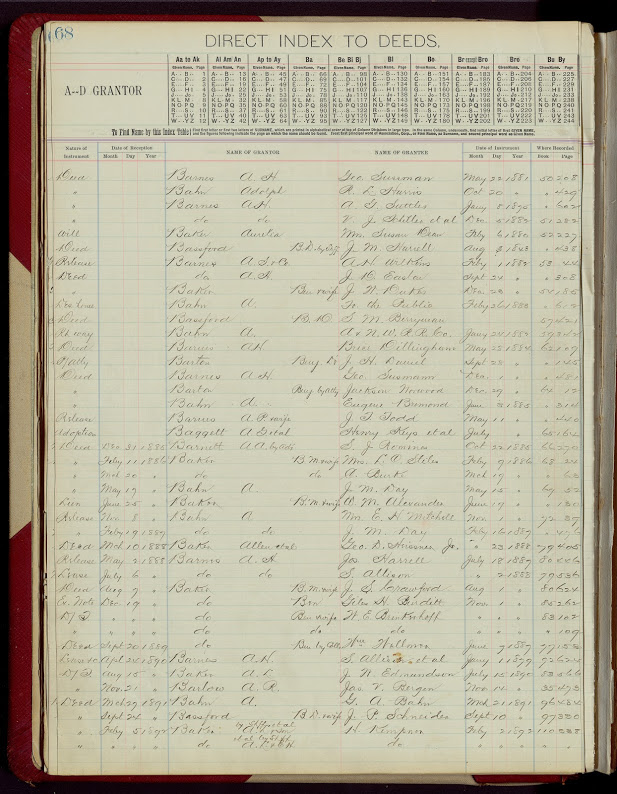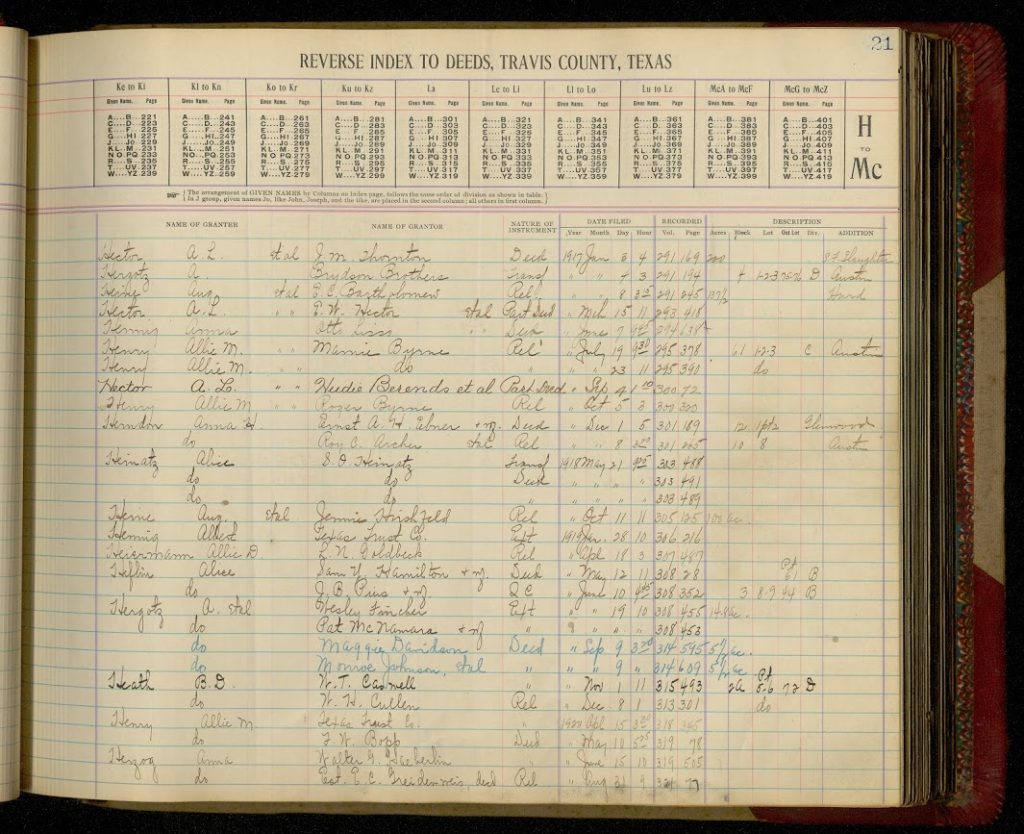Deed Research in Travis County
Wednesday, May 6th, 2020 in collections, County Clerk, Portal to Texas History, research. 22 Comments
What are deeds?
Deeds are legal records that document the ownership and conveyance of property. Deeds record the transfer of real estate from the current owner (grantor) to a new owner (grantee).
How do I search for deeds?
The deed is one of the oldest and most common types of county records. Deed records in Texas are kept by County Clerk of the county in which the property is located. The information that can be found in deeds far surpasses the basic transfer of land from one person to another, and often points to other records or avenues of research to pursue. Recorded among Travis County deeds are other types of property records, such as bills of sale, contracts, deeds of trust, easements, liens, and mortgages. Deeds can provide information about family members, social status, occupation, and neighbors. Early land deeds are especially detailed and predate most other record sources, increasing the importance of land records the further back a researcher goes.

Deed records are extremely voluminous and can take a significant amount of time to research, depending on how much information you hope to compile on a property. Deed records are not organized by property address, but rather by the names of the buyers and sellers. If you are researching the history of a specific property, it is often easiest to begin with the current property owner and then tracing back the chain of ownership (if you know the property address but not the owner, start by looking the property up on the Travis Central Appraisal District website). In practice, deed research can be a difficult and lengthy process.

When deeds are recorded, cumulative indexes to the deeds are compiled. There are two types of indexes: the direct index, which is organized by the grantor (seller) name, and the reverse, or indirect, index, which is organized by the grantee (buyer) name. Travis County deed indexes can span multiple years, a single year, or part of a year, depending on the volume of deed records filed.

Indexes are not listed in strict alphabetical order, but rather, they are organized chronologically by the first two letters of the party’s last name and the first name. In the grantor (seller) index, entries are organized by the grantor’s last name; in the grantee (buyer) index, entries are organized by the grantee’s last name. Each entry includes the names of both the grantor and grantee, type of instrument (legal document), and the volume and page number where the full text of the deed is found. Travis County’s earliest deed indexes do not include the property location, although later indexes do. When the index does not include the property location, and there is more than one transaction listed for the names you are searching, you will need to read the text of each deed to differentiate the properties.
It is important to be aware that names may be misspelled or listed under variations, and there can be multiple individuals with the same name and multiple transactions between the same parties. If an initial search for a name does not turn up any information, check under other possible spellings. Early index book entries are handwritten, and sometimes names can be difficult to read – some clerks had better handwriting than others. Abbreviations are also commonly used in indexes. A few examples include:
- Chat Mtge – chattel mortgage
- Do – ditto (same as above)
- D/T – deed of trust
- Mchs Lien – mechanics lien
- Mtge – mortgage
- P/Atty – power of attorney
Where do I find the deed indexes and deeds?
The Travis County Clerk’s office records and maintains the county’s deed records. Historically, deeds were recorded in large bound volumes, and the books are microfilmed for easier access. More recent deeds are recorded digitally.
Records can be accessed in a variety of ways, including on microfilm at the County Clerk’s office, online on the County Clerk’s website, and online on the Portal to Texas History.
Deeds and Deed Indexes, 1840 – mid-1980s
Deeds from 1840 to the mid-1980s were recorded in bound volumes; these books are microfilmed, and the microfilm is available at the County Clerk’s office for visitors to use in their research.* Until recently, this was the easiest way to access older Travis County deed records.
However, since 2015, the County Clerk’s office has collaborated with the Travis County Archives to digitize the original bound volumes and place the images online. Currently, deeds from 1840-1919 and indexes from 1842-1924 (a total of over 300 books) are available online on the Portal to Texas History. Images are free to access and download. The digitization project is ongoing, and more books are continuously being added.
- Travis County Deed Records on the Portal to Texas History, 1840-1919 (Books A-Z, 26-315): https://texashistory.unt.edu/search/?q=travis+county+deed+record&t=dc_title&sort=title
- Travis County Direct Deed Indexes, 1842-1924: https://texashistory.unt.edu/search/?q=travis+county+direct+index+to+deeds&t=dc_title&sort=title
- Travis County Reverse Deed Indexes, 1842-1924: https://texashistory.unt.edu/search/?q=travis+county+reverse+index+to+deeds&t=dc_title&sort=title
Currently the Archives is digitizing deed books from the early 1920s and will progress forward through the decades. To check on the status of a book, you are welcome to contact the Archives. The Archivist can be reached at 512-854-4675 or christy.costlow@traviscountytx.gov.
For deeds records that date after 1919 to the mid-1980s, microfilm is the best method of access until the books are digitized. For a fee, the Clerk’s office can perform searches for patrons.
Travis County Clerk
Recording Division
5555 Airport Boulevard
Austin, Texas 78751
512-854-9188
TCCCopyCenterResearch@traviscountytx.gov
Deeds and Deed Indexes, mid-1980s – present
More recent deeds can be accessed online on the County Clerk’s website at https://www.tccsearch.org/.
To search deed records by name:
- Go to https://www.tccsearch.org/RealEstate/SearchEntry.aspx
- Enter the grantor (seller) name in the grantor field (format: LastName FirstName)
- Enter the grantee (buyer) name in the grantee field (format: LastName FirstName)
- Select search
- Click “view” in the image column for the record you wish to view
- Note: If you only have one party’s name or do not know if they are grantor or grantee, you may need to conduct a separate search under both fields or use the combined name search.
*As of March 24, 2020, Travis County offices and lobbies are closed due to Covid-19 concerns. Normally offices are open Monday – Friday, 8:00am-5:00pm, except legal holidays.
We need to amend the sale of a deed. How is this done?
Hello! You will need to contact the Recording Division of the County Clerk’s office. Their staff will be able to assist you.
Telephone: (512) 854-9188
Email: recording@traviscountytx.gov
I live in thomaston ga and my dad pasted away and I lived with him and he did not have a will and my sister had me put off the land her and the law and are saying that I do not get anything and that I can not get any of my stuff of of the land that I have lived on for 37 years and as we speak I have been living in my truck for 9 days other words I am homeless and i was by my daddys side everyday of my life, and I don’t have any money to do anything and I need to know what I can do , because she has took every thing and I have received nothin at all and my sisters kid was living in the house before my dad was put in the ground, if you can help me in any way please call me 7067418214 Lee Thrasher Jr thanks
Unfortunately we cannot provide help with legal questions. If you are looking for legal help regarding probate in Travis County, you may contact:
Lawyer Referral Service of Central Texas
http://www.austinlrs.org
Texas RioGrande Legal Aide
http://www.trla.org
Transfer on Death Deed: Free Information, Instructions and Form
texaslawhelp.org/resource/transfer-on-death-deed-information-instructions-and-forms
Travis County Law Library
http://www.traviscountylawlibrary.org
State Bar of Texas
http://www.texasbar.com
Texas Law Help
http://texaslawhelp.org
Where do I go to transfer name of house on deed? My husband and I divorced and I got the house. I already have the claim form and it has been notarized. Just looking for next steps. Thank you, sandra
You will need to contact the County Clerk’s Recording Division.
Telephone: (512) 854-9188
Email: recording@traviscountytx.gov
how do i do a title search and get the liens off the property I now own without clear title
This is outside our area of expertise. You may want to start by contacting the title company to do a title search. If you have further questions, the Travis County Clerk’s Office may be able to provide some guidance.
Telephone: (512) 854-9188
Email: recording@traviscountytx.gov
Hey, I need more information is it possible that you share more of it?
What does it mean when there is no record on deed in TravisCad records?
Where did you see this message? We need a little more info! Thanks!
My wife and I bought a property. We paid cash for the sale. The title company paid off the mortgage/lien to the lender.
The seller received a release of lien from the mortgage company. How and where do we get the deed to the property?
You will need to contact the County Clerk’s Recording Division. They will be able to assist you. recording@traviscountytx.gov or (512) 854-9188.
My wife and I got divorce. I received the house, and she received monies. I have the divorce decree that states I am the sole property owner. My wife’s name is still on the deed. What is needed to remove her name from the property deed?
The staff at the County Clerk’s Office should be able to provide you with more information regarding the process. They can be contacted at:
recording@traviscountytx.gov or (512) 854-9188.
I need to get a list of all parties who were deeded a particular property since 1951, how can I get this done the most quickly?
Deed research can be quite time-consuming, especially if the property has changed hands several times. Doing the research yourself will involve tracing the deed transactions for the property backwards (or forwards) through the County Clerk records. There are title research companies who can assist with research, which may be a quicker option.
How can I get a copy of my parents house they bought in the 1960s?
How can I get a copy of the deed to my parents house they bought in the 1960s?
You will need to contact the County Clerk’s Office, Recording Division. Their staff will be able to do a search to locate the record.
recording@traviscountytx.gov or (512) 854-9188
I am a member of the Daughters of the Republic of Texas. I am wanting to obtain a Deed that was recorded in 1840. The following is the reference: Deed Book, Travis County Courthouse, Austin, vol. Q, 561-564; “beautiful piece of property” in Dubois to Guizot, November 6, 1840, in Barker, French Legation, I, 170. DRT has recently completed a new building, Republic of Texas History Center/810 San Marcos St., Austin. We want to verify that our property was originally part of the 21.5 acres that Dubois purchased in 1840. Thank you for your assistance.
I’m sending you an email regarding this request. -Christy